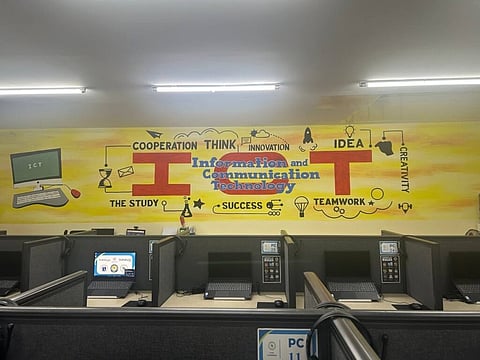
- NEWS
- the EDIT
- COMMENTARY
- BUSINESS
- LIFE
- SHOW
- ACTION
- GLOBAL GOALS
- SNAPS
- DYARYO TIRADA
- MORE

ChildFund Philippines, an organization dedicated to improving the lives of children experiencing deprivation, exclusion and vulnerabilities, has partnered with the local government of Manila and the Department of Education (DepEd) to modernize information and communication technology (ICT) facilities in public elementary schools.
The Pro-Digital LOOP Project, launched in November 2023, aims to enhance digital learning by upgrading ICT facilities, training communities on safe digital practices and supporting national online child protection policies.
Marlene Floresca, senior education specialist at ChildFund Philippines, stressed that multi-sectoral partnerships are crucial for the initiative’s holistic impact.
“The project has transformed schools and homes by equipping them to better support children’s digital learning,” Floresca said. “Our approach not only provides technology but also strengthens safe digital literacy, ensuring that children can thrive academically and protect themselves online.”
Meantime, Eremeo Monte, ICT coordinator at Fernando Ma. Guerrero Elementary School in Manila, has already observed a significant shift in the classroom.
“Many of our students now come to school excited to learn because they can explore digital tools safely and creatively,” Monte said. “We’ve seen how ICT hubs can spark curiosity and help students learn better across subjects — from reading to science.”
Carol Salba, principal at Bagong Barangay Elementary School, highlighted the broader impact on students, noting increased motivation and participation.
“The gadgets and instructional materials provided through the project have been a great opportunity for our students,” Salba said.
“They are more motivated to learn, which translates into increased participation and a lower dropout rate this year. We hope this program continues so that even more students can benefit from it,” she added.
Since its launch, the Pro-Digital LOOP Project has enhanced digital learning in 10 Manila public elementary schools. The project has provided 200 laptops, smart TVs, printers and air conditioners, and refurbished ICT hubs with high-speed internet.
Additionally, 200 licensed Microsoft applications were distributed, and 346 teachers — including subject specialists in math, reading and science — along with ICT coordinators, principals and education staff, received training in using multimedia digital resources for elementary students.
The project also engaged more than 2,000 parents and caregivers, orienting them on the goals of Pro-Digital LOOP and the importance of safe digital learning at home. During the last quarter of 2024, over 6,000 students and nearly 400 teachers actively used the ICT hubs, improving their digital skills and academic performance.
Minjin Kim, country program manager of ChildFund Korea, noted that “teachers have become more confident using digital tools to deliver lessons effectively,” and students are more engaged and better able to understand their lessons. Kim attributed this to the interactive nature of digital learning and the enhanced access to academic resources provided by the ICT hubs.
Beyond schools, the project has contributed to strengthening policies on safe digital literacy and learning environments. Collaborative meetings with tech companies like Meta and TikTok have paved the way for upcoming advocacy meetings and policy dialogues involving children.
Furthermore, engagements with the DepEd’s Learner Rights and Protection Bureau are set to include online safety in the revised DepEd Child Protection Policy, supported by training initiatives and policy digitalization efforts.
